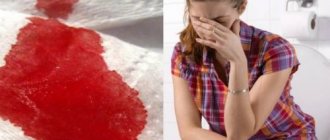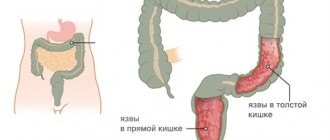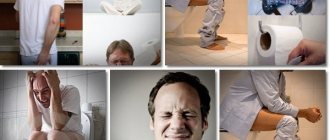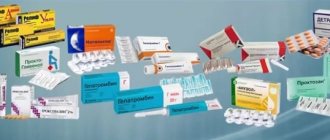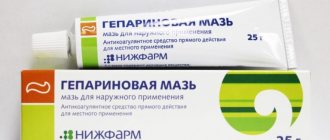Surgery
For advanced external hemorrhoids, minimally invasive techniques are ineffective. Large nodes that are prone to inflammation and pinching can only be removed surgically, using a scalpel or an electric knife. In the latter case, the tissues are cauterized, which reduces the risk of bleeding.
How to get rid of external hemorrhoids if they are in an advanced stage? The most popular operation is performed using the Milligan-Morgan method.
It can be carried out in an open or closed manner. In the first case, the nodes are ligated at the base and then excised along with a small amount of the surrounding mucosa. The threads are tightened, but the wounds are left open.
In a closed operation they are sutured. An operation is possible with cutting the mucous membrane and removing the affected part of the vessel through it. The choice of method depends on the doctor and the patient's condition.
The operation is performed in a hospital, under general anesthesia or epidural anesthesia. The recovery period depends on the method.
So, how long does it take to treat external hemorrhoids if the Milligan-Morgan method was used? With the open method it takes 1-1.5 months, with the open method it is reduced to 3 weeks.
Relapses are possible, but with proper nutrition and the absence of provoking factors, they occur no earlier than after 12-15 years.
In some cases, doctors recommend surgery using the Longo method. It is less traumatic and suitable for weakened patients.
During the operation, the nodes are stitched and tightened, freeing the lumen of the rectum, but are not cut off.
Over time, the displaced parts of the vessels are overgrown with connective tissue, the nodes decrease in size, and the vascular walls become denser and more elastic. The advantages of the method are its painlessness, absence of incisions and bleeding.
How long does it take for external hemorrhoids to go away after Longo surgery? Since the operation is performed in a hospital, the recovery period does not exceed 2 weeks. Remission depends on lifestyle; in the absence of provoking factors, hemorrhoids will not return.
When can you do without surgery?
It is worth noting at the very beginning that the choice of treatment method, as well as the choice of medications and their dosage, is entirely the prerogative of the attending physician. This choice depends on many factors - the type of hemorrhoids, the stage of the disease, the age of the patient, concomitant pathologies, etc.
Diet for hemorrhoids and lifestyle changes
There is no need to follow a strict diet for hemorrhoids. But, since with this disease straining during bowel movements is undesirable, the patient must change his diet so as not to provoke constipation.
- To do this, you should introduce more foods rich in fiber into your diet - vegetables, fruits, fresh, boiled and baked.
- If constipation really bothers the patient, he is prescribed mild laxatives that thin the stool.
Stage 1 hemorrhoids when changing the patient’s diet, as well as lifestyle (do not sit for a long time on a hard flat surface, engage in light sports, wash the perineal area with cool water after defecation, avoid hot baths, etc.) may even disappear without a trace without further treatment.
Drug treatment of hemorrhoids
- in the treatment of hemorrhoids, homeopathic preparations can be used - such as Fleming's ointments, Aesculus. Homeopathic suppositories with belladonna are also effective;
- suppositories “Bezorpil”, “Proctoglivenol”, “Posterizan”, “Ultraprokt”, “Preparement N” are prescribed according to the scheme twice a day - after bowel movements, and also before bedtime;
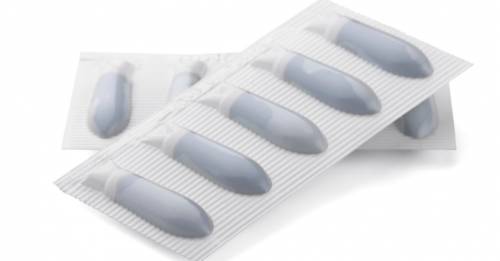
- if pain is observed with hemorrhoids, the formation of a fissure in the anus, or pinched varicose nodes, then troxevasia and heparin ointments and the remedy “Hepatrombia G” are prescribed;
- the patient may be prescribed microenemas with infusions of chamomile, calendula, rosehip oil, sea buckthorn, and Vishnevsky ointment;
- in case of inflammation and severe pain due to hemorrhoids, physiotherapy can be prescribed - UHF, quartz lamp;
- for inflammation of the lymph nodes, anti-inflammatory ointments have a good effect - “Levomekol”, “Levasin”, “Mafipid”;
- If bleeding is observed with hemorrhoids, suppositories with adrenaline are prescribed. Locally, hemostatic agents are used - “Beriplast”, “Spongostan”, “Adroxon”, “Tachicomb”;
- General treatment for hemorrhoids involves the use of phlebotropic drugs - such as Veporuton, Detrolex, as well as Relief Advance suppositories.
Use of surgery
In later stages of the disease, treatment is often carried out using surgery. Its use in most cases is carried out if conservative treatment does not bring the necessary results.
When hemorrhoids prolapse or the disease progresses, these methods are also used.
In most cases, the following is used:
Sclerotherapy
This method consists of introducing special medications into the hemorrhoids, with the help of which the walls of the blood vessels are glued together. The procedure leads to a significant reduction of the hemorrhoid. This modern, painless treatment method is used in most cases on an outpatient basis.
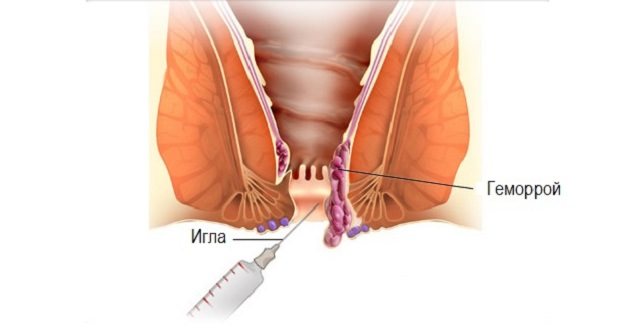
Desarterization
Thanks to the use of innovative equipment, the arteries that are involved in the formation of hemorrhoids are calculated. This treatment method makes it possible to eliminate the flow of blood to hemorrhoids.
The duration of the procedure is several hours. It is completely painless and does not bring any discomfort to the patient. The duration of the recovery period is no more than 4 days.
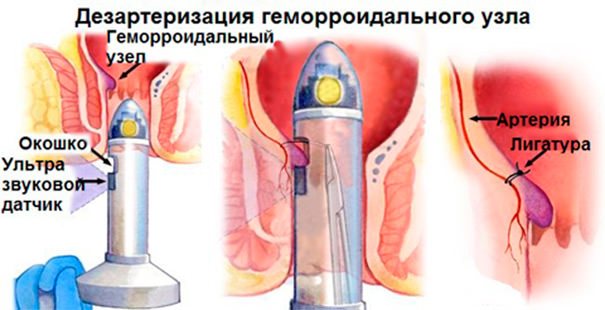
Thrombectomy
This is the most common and highly effective method of treating hemorrhoids. It requires the use of laser radio waves. Anesthesia is used for the procedure. Its action is aimed at reducing thrombosis.
Preparations for external use: suppositories, ointments, creams, gels
Many people believe that the best remedies for hemorrhoids in women and men are suppositories or ointments. There is some truth in this. The main advantage of external medications is their speed of action. Therefore, they are most often used to instantly relieve pain, itching, and the feeling of a foreign body in the rectum.
Drug therapy is quite effective in acute and chronic forms of the disease. It is also used after hemorrhoidectomy. With the help of medications, the symptoms of the disease are relieved, and its complications are also prevented.
Medicines are used regularly for chronic hemorrhoids to prevent exacerbation.
With the help of medications, pain is eliminated, the inflammatory process is stopped, and bleeding is stopped. Some patients are prescribed medications to improve blood flow to the hemorrhoidal area and also reduce capillary fragility.
Drug treatment is characterized by the presence of a huge number of advantages, one of which is the elimination of unpleasant symptoms. The action of the medications is aimed at eliminating itching, burning and pain in the anal area.
Also, with their help, inflammation is relieved and hemorrhoids are reduced. The disadvantage of this treatment is that in later stages it is ineffective.
The best candles
The introduction of suppositories is carried out into the anus, which allows them to act directly on the inflammatory focus. That is why during the period of use of these medications their fastest possible effect is ensured.
Effective ointments
Patients are recommended to use the following for hemorrhoids:
- Heparin ointment;
- Troxevasin;
- Ginkor-procto;
- Proctoglivenol, etc.
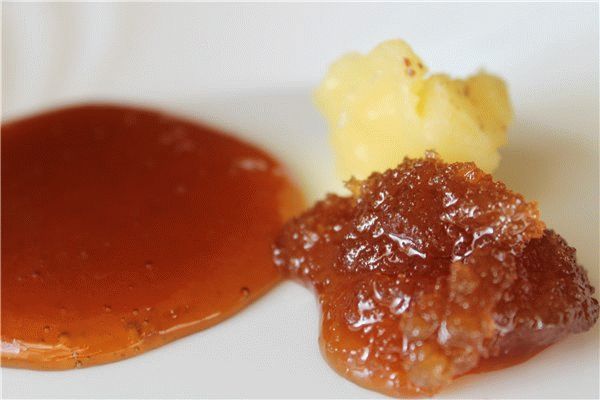
Also, treatment can be carried out with Aurobin, Ultraproct, Nefluan. In case of complications of the disease, it is recommended to use Proctosedyl.
Elimination of pain arising from anal fissures is carried out with the help of antispasmodics. The most effective of them are Baralgin, Verolgan, Spazmoveralgin.
For microcirculatory disorders, Trenal, low molecular weight dextrans, and acetylsacylic acid are prescribed. In order to reduce the fragility of capillaries, patients are prescribed phlebotonics.
Chainsaws are medications that improve blood microcirculation in the pelvic area. For constipation, the patient is advised to take laxatives.
If the patient experiences an exacerbation of the disease, then he must be provided with comprehensive treatment using ointments, creams, tablets and suppositories. All drugs should have a different spectrum of action, which will allow the exacerbation of the disease to be suppressed as quickly as possible.
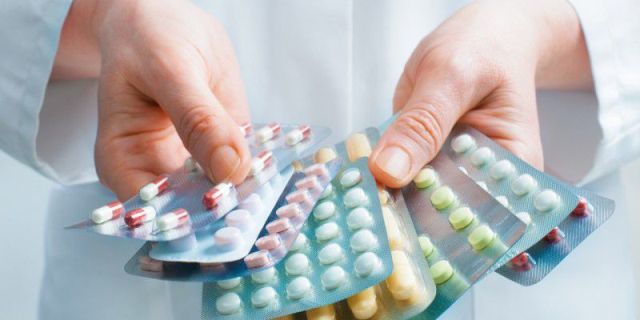
In most cases, patients are prescribed antispasmodics, immunomodulators, hemostatics, anticoagulants, venoprotective and venosclerotic drugs.
If an inflammatory process is observed with hemorrhoids, then a person needs to take anti-inflammatory medications. Patients are recommended to use Proctosedyl, Proctoglivenol, Relief, Hepatrombin G.
They have excellent anti-inflammatory and antiseptic properties, which allows them to eliminate the disease as quickly as possible.
Treatment of thrombosis
To eliminate thrombosis in hemorrhoids, it is recommended to use appropriate medications, which increase the tone of the veins, as well as reduce their permeability. Thanks to these medications, blood microcirculation is restored, as well as swelling is eliminated.
The action of medications is aimed at combating the inflammatory process. During the period of drug use, the possibility of further damage to the veins is eliminated. In most cases, thrombosis therapy is carried out using Ginkgo-Biloba, Troxevasin, Procto-Glivenol.
To avoid exacerbations during the chronic stage of the disease, regular use of anticoagulants, for example Detralex, is necessary. When used, blood clots dissolve as quickly as possible.
Also, the drugs have anti-inflammatory and anti-edematous properties. During their use, active restoration of connective tissue, as well as healing of cracks, is observed. To treat the chronic form of the disease, patients are recommended to use heparin-based drugs.
Quite often, bleeding is observed with hemorrhoids. In order to stop them, anticoagulants and hemostatics are used. Doctors prescribe medications to patients who suffer from a chronic form of the disease.
The most effective medicine is Natalsid, which is developed on the basis of sea algae. It helps to regenerate tissue and heal cracks. During treatment with the drug, bleeding is stopped. The medicine has a pronounced hemostatic effect.
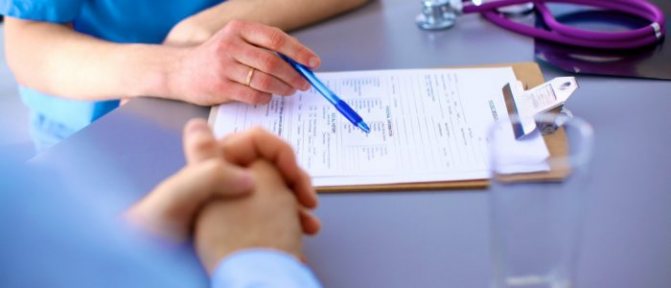
If constipation is observed with hemorrhoids, this leads to complications of the disease. Excessively hard feces injure hemorrhoids, which can lead to bleeding.
To eliminate constipation, it is necessary to take laxative medications in the form of tablets or suppositories, for example Laxigal, Senade, Microlax.
Recommendations
In order for treatment to be as effective as possible, it must be carried out according to certain rules:
- Before using a particular medicine, the patient should always consult a doctor. Absolutely all manifestations of the disease require complex treatment.
- Changing the dosage of a medication on your own is strictly prohibited, as this may negatively affect the course of the disease.
- If there are allergic reactions to certain medications, they are replaced with analogues.
- The use of drug therapy will be most effective only in the initial stages of the disease. After the operation, it is also recommended to use medications to ensure its effectiveness.
Conservative therapy
This treatment is carried out through the use of drugs from various pharmacological groups, which include:
- Venotonics are drugs that increase the tone of the walls of venous vessels, due to which hemorrhoids are reduced in size and the development of new nodes is prevented. These medications are used in the form of tablets (Trental) and local ointments (Troxevasin). The duration of treatment with venotonics is about 2-3 months. If necessary, the course is repeated.
- Anti-inflammatory drugs - reduce the intensity of inflammatory processes in the area of hemorrhoids, thereby reducing the severity of pain, itching and discomfort in the rectal area. They are also used in the form of tablets (Ketanov), powders (Nimesil) and ointments (Prednisolone ointment). This group of drugs is used with caution, since long-term use may lead to the development of gastritis or stomach ulcers. The course of treatment with anti-inflammatory drugs is usually no more than 10 days.
- Local anesthetics - reduce the severity of pain and itching in the area of hemorrhoids, by blocking the conduction of impulses along sensitive nerve fibers and endings. Suppositories with an anesthetic (Anestezol) are used, which are a means for the symptomatic treatment of hemorrhoids.
- Hemostatic drugs - used for bleeding from hemorrhoids. Today, Dicynon or Detralex tablets are used. Also, to quickly stop bleeding, cold is used locally (compresses from a napkin moistened with cold water). If severe bleeding continues, surgical removal of the hemorrhoid is performed.
- Means for preventing the formation of blood clots in hemorrhoids (anticoagulants) – Heparin ointment, Troxevasin are used, which prevent the formation of blood clots and the development of edema in the area of hemorrhoids. They also improve the outflow of venous blood and lymph, thereby reducing the size of hemorrhoids and their inflammation. The average duration of use of these funds is 10 days.
- Local antiseptics are necessary for the prevention of secondary infection and the development of complications (abscess, fistula formation) for stage 3-4 hemorrhoids. They are used in the form of an ointment (Vishnevsky ointment, Levomekol) for a course of about 7 days.
- Regenerating agents are medications, the use of which accelerates the processes of regeneration (healing and restoration) of tissue in the area of hemorrhoids. These medications are used topically (locally) in the form of suppositories for hemorrhoids (Proctosan, Ultraproct).
- Immunomodulators are a group of drugs that increase the functional activity of the immune system, help prevent secondary infection of the hemorrhoid and the development of purulent complications. They are taken orally in the form of tinctures (tincture of lemongrass, ginseng, eleutherococcus).
- Combination drugs – contain active substances of various pharmacological groups, thereby increasing the effectiveness of therapy and ease of use (instead of several drugs, one is used). This group of medications for hemorrhoids has become widespread and popular today. Combination rectal suppositories are usually produced (Relief, Proctosedyl).
Conservative drug therapy for hemorrhoids has a good effect at the initial (1-2) stages of development of hemorrhoids, reduces the severity of inflammation and their size (involution - reverse development of the hemorrhoid). The earlier treatment is started using drugs from various groups, the higher its effectiveness. Also, medications are necessarily used when using methods for radical removal of a hemorrhoid in preparation for the procedure and during rehabilitation.
The selection of medications and drugs is carried out on an individual basis, depending on the size and location of hemorrhoids, the presence of complications (bleeding, infection) and the prevailing symptoms of the pathology (pain, itching, swelling).
Drugs during pregnancy
Waiting for a baby can result in prolapse of hemorrhoids for a woman. The most common reasons:
- increased blood volume and increased load on blood vessels;
- pressure from the growing uterus on all internal organs, including the intestinal tract (this causes constipation);
- strong efforts during childbirth.
Drug therapy is justified only in the acute phase of the disease.
Many medications are contraindicated for pregnant women. For example, non-steroidal anti-inflammatory drugs, analgesics and other drugs
Therefore, treatment of pathology in expectant and nursing mothers is carried out with increased attention to their condition and caution. Doctors in such situations prescribe mainly topical drugs
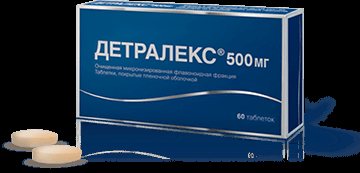
Semenov I.A. proctologist: “Pills for hemorrhoids are part of a systemic treatment strategy for patients with chronic and acute forms of the disease. Prescribing medications is the prerogative of the attending physician, who individually selects an effective treatment regimen. Treatment tactics depend on the patient’s condition and the stage of development of the pathology.
The main task of medications is to eliminate symptoms and prevent possible complications. In addition, pharmacotherapy is aimed at eliminating inflammation, improving blood circulation and stopping bleeding. Medications are also indicated before and after surgical procedures.
Comprehensive treatment of hemorrhoids always includes taking phlebotropic drugs. In Russia, the domestic drug Venarus and the French drugs Phlebodia and Detralex are often prescribed.
For severe inflammation, non-steroidal anti-inflammatory drugs (Xefocam, Diclofenac and others) are indicated. In the acute course of the disease, enzyme preparations and prebiotics are recommended (Mezim, Panzinorm, Creon, Hilak Forte). Medications should normalize the proper functioning of the digestive tract.
In addition to medications, complex treatment should include anti-inflammatory ointments, gels and creams.”
It is obvious that this insidious disease cannot yet be treated with any one medicine. There are no drugs that solve all problems at once. Therapy for this disease is always complex and sometimes quite complicated.
The main thing is to contact a specialist at the first suspicion of the development of the disease, get examined and complete a full course of treatment. In this case, the disease will not have a single chance to develop into its most unpleasant forms. And recovery will be quick and effective.
THERE ARE CONTRAINDICATIONS CONSULTATION WITH YOUR DOCTOR IS REQUIRED
Surgical methods of treatment
Indications for surgical treatment of hemorrhoids:
- conservative treatment did not bring any results;
- the disease progresses, symptoms increase, the person’s health and ability to work deteriorate;
- With each bowel movement, the hemorrhoids fall out.
- Surgical treatment of hemorrhoids with laser
Today this method of treating hemorrhoids is the most common. The laser has been successfully used for operations on very large nodes.
//www.youtube.com/embed/yW_jiqTNz38?rel=0
- Radio wave surgical treatment of hemorrhoids
This treatment method is performed using the modern Surgitron device. The treatment is quick and not labor-intensive.
With radio wave treatment, fewer complications are detected because the tissues are not damaged, and subsequently scars do not form.
The operation is performed on an outpatient basis, under local anesthesia. A few hours after treatment, the patient returns to his normal lifestyle.
- Surgery for the treatment of hemorrhoids - hemorrhoidectomy
Most often, this operation is performed for hemorrhoids of stages 3-4 of the disease, as well as if blood clots form in varicose nodes.
The operation is simple and does not require hospitalization of the patient. The operation can be performed using a scalpel, laser or electrocoagulation.
Hemorrhoidectomy involves excision of areas of skin and mucous membrane over the nodes. After excision, the wounds are sutured (Ferguson method) or left open (Milligan-Morgan method) - this depends on the surgeon’s tactics and the volume of tissue excision.
Complications after surgery - acute pain during bowel movements, urinary retention. The patient is prescribed sitz baths, diuretics, and laxatives. 1 week and three weeks after surgery, follow-up examinations are required to check for stenosis of the rectal walls. The wounds heal completely within one month.
- Surgical treatment of hemorrhoids using the Longo method, or transanal resection of the rectal mucosa
This method has become an alternative to the classic hemorrhoidectomy operation; it has been used since 1993.
Transanal resection involves removing part of the rectal mucosa at the site where the hemorrhoids prolapse. Thus, varicose nodes in the rectum are not removed, but are pulled upward, regressing and further overgrown with connective tissue.
The operation is performed under local anesthesia and takes no more than 15 minutes.
The disadvantage of the Longo operation is the need for the patient to stay in the hospital for at least a week. External hemorrhoids cannot be removed using this method.
- Classic excision of hemorrhoids
This operation is the most traumatic and complex; it is performed in a hospital under general anesthesia. The treatment method requires a very long postoperative recovery period and may be accompanied by pain.
But this is the only correct method for removing hemorrhoids that fall out of the anus, which threaten massive bleeding and are constantly increasing.
In the postoperative period, careful care of the anal and rectal area is very important, as well as plenty of painkillers.
The essence of complex treatment of hemorrhoids
The term “complex treatment” implies the use of several types of therapies, including therapeutic diet and exercise, medication and surgical methods. A comprehensive course of treatment for hemorrhoids - prevention of congestion in the pelvic area, as well as prevention of constipation. In other words, in addition to taking medications, the patient must exercise regularly, adhere to a diet, and give up alcohol.
Complex treatment for hemorrhoids relieves the symptoms of the disease through medications, without resorting to surgery if possible.
The treatment should be carried out by a proctologist who can take into account the peculiarities of the course of the disease and its severity in order to prescribe effective medications. As a result, the functioning of the gastrointestinal tract is normalized, spasms and inflammation are eliminated, and the patient’s rectal sphincter relaxes. In addition, the main problem is solved - elimination of hemorrhoids, normalization of blood circulation in the abdominal cavity.
Treatment of hemorrhoids with hydrogen peroxide
There are many treatments for hemorrhoids. Many of them promise to eliminate the disease in one day, but when using such methods, you must remember that most often they eliminate the consequences, but not the problem itself.
One of the effective ways to treat the disease is to smooth out the unpleasant symptoms of hemorrhoids with hydrogen peroxide. Existing methods of treating the disease with various folk remedies have become widespread among patients.
After wetting a cotton pad, dip it in a 3% peroxide solution. Then you need to apply the resulting compress to the inflamed area. You need to repeat the procedure several times a day, changing the disk generously moistened with hydrogen peroxide. Sometimes the compress is left overnight or used until the pain goes away.
Enemas prepared with water and hydrogen peroxide will help get rid of the discomfort that occurs during discharge. To do this, dilute a glass of water with 3% hydrogen peroxide and inject the solution inside. Repeat the procedure for three days until visible improvements. If the situation worsens, you should consult a doctor.
Treatment regimen for hemorrhoids
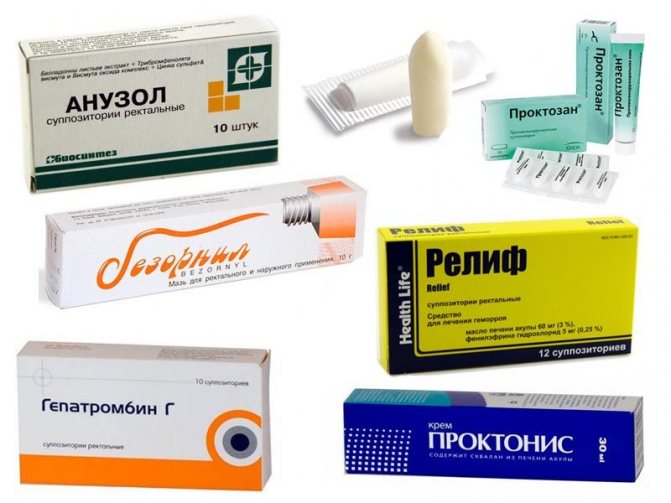
During therapy, you should adhere to the following recommendations:
- compliance with the regimen and administration of medications prescribed by the attending physician;
- avoiding physical activity until full recovery;
- walks to ensure blood flow and speed up the effect of conservative treatment;
- diet to heal the digestive tract;
- taking eubiotics: Linex, Bifiform and others;
- drink plenty of fluids to improve bowel movements (at least 2 liters per day).
Drugs
To avoid surgery, patients are prescribed a conservative treatment method. This method consists of eliminating the symptoms of the disease. The choice of a particular drug directly depends on the form of hemorrhoids.
In order to eliminate the internal form of the disease, suppositories and ointments are used. With their help, the inflammatory process is relieved, pain is relieved and the possibility of bleeding is prevented.
To treat the external form of the disease, creams and ointments are used. With their help, the sensation of itching and pain is eliminated, as well as the size of hemorrhoids is reduced.
Let's consider the best drugs (suitable for 2 forms of the disease):
Relief
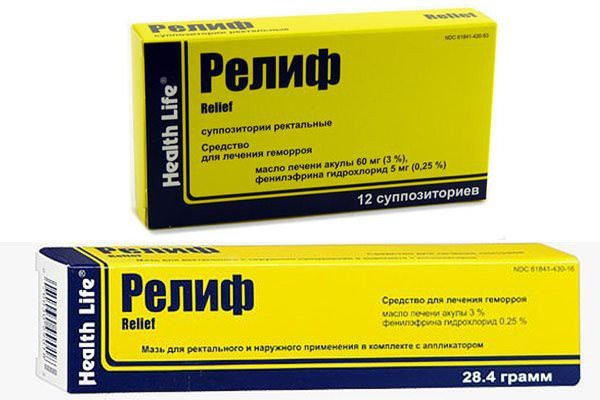
The medicine has local healing properties and has a positive effect on improving blood clotting.
Gepatrombin G
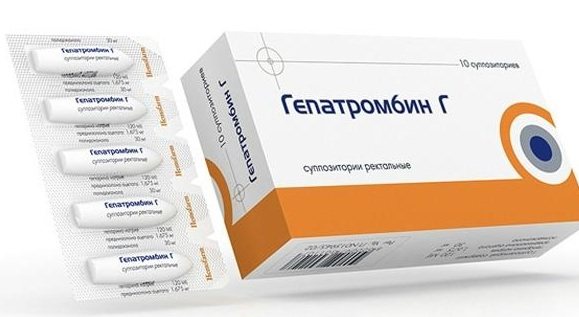
The drug is used for the external form of the disease. The medicine is developed on the basis of heparin, which ensures the fastest healing of tissues, as well as cell regeneration.
Aurobin
The medication has analgesic properties. With its help you can eliminate itching in the shortest possible time, as well as heal cracks and erosions in the anal area.
Complex treatment of hemorrhoids requires the use of not only topical drugs, but also other drugs:
- Special medications that improve vascular tone.
- Non-steroidal drugs that have anti-inflammatory and analgesic properties.
- Laxative medications. With their help, the intestines are cleansed of feces as carefully as possible.
Quite often, patients are prescribed medications that have a general auxiliary effect:
Detralex
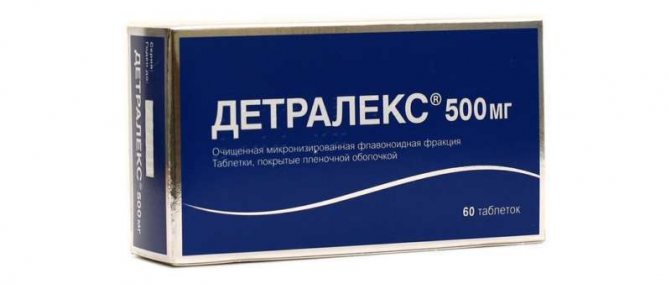
With its help, the possibility of rupture of blood vessels is eliminated, as well as the elasticity of blood vessels is ensured. The use of the drug by pregnant women and during lactation is prohibited.
Litovit-B
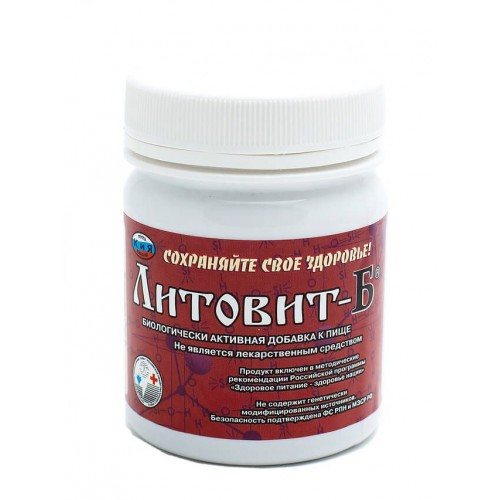
The medicine is also based on plants. That is why it is allowed to be used during pregnancy and breastfeeding. With the help of the medicine, damaged mucous membranes heal as quickly as possible. The medication has a mild laxative property.
Ginkor Fort
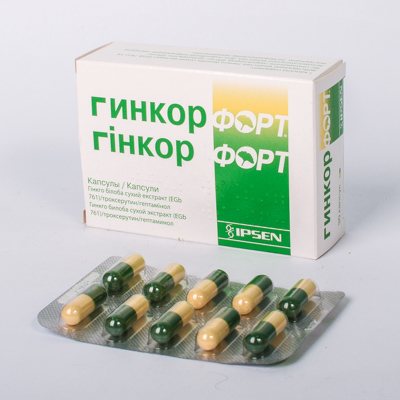
The action of the medication is aimed at improving blood circulation in the rectal area, which contributes to the successful treatment of hemorrhoids.
Posterisan
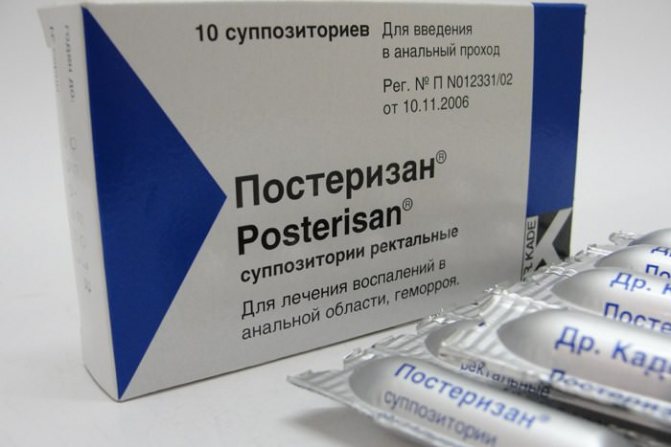
It is a mild laxative that helps strengthen the walls of blood vessels. During the period of use of the medicine, cracks and damage to the rectum heal as quickly as possible. The action is aimed at reducing thrombus formation and eliminating the inflammatory process.
https://youtube.com/watch?v=fLLXQA8RvyY%3Fstart%3D1%26feature%3Doembed
Conservative treatment of hemorrhoids: methods
So what does this type of therapy involve?
This is treatment using various medications and topical medications. Since curing hemorrhoids, as already noted, is not so easy, doctors practice a whole range of methods that have a positive effect on recovery. Among them are the following:
- pills;
- preparations for external use;
- traditional methods;
- nutrition adjustments;
- increase in physical activity.
To eliminate bleeding during bowel movements, eliminate inflammation, improve blood circulation and minimize pain, doctors often prescribe tablet medications. They are able to eliminate the symptoms and causes of the disease and are prescribed during its exacerbation.
The list of topical medications includes various suppositories, ointments and creams. They allow you to treat the disease at the very source of its expression. Rectal suppositories dry out and reduce the size of hemorrhoids. Ointments and creams can stop the inflammatory process and heal cracks formed in the anal area.
Drug treatment of hemorrhoids also includes folk methods, which have a huge arsenal of tools aimed at treating hemorrhoids. These include decoctions of medicinal herbs for local baths, various lotions made from herbal infusions, and ointments based on natural ingredients.
At the same time, compliance with all three methods will not be able to be as effective as possible if two more points are not observed. Most doctors recommend a whole complex to get rid of this disease. Establishing nutrition means eating foods that have a positive effect on digestion, drinking a lot of water - all this to stop constipation and normalize stool.
Increasing physical activity will help improve blood circulation in the veins and arteries and improve blood flow in the pelvic area. Thanks to this, stagnation in this zone stops, and the formed nodes can decrease.
